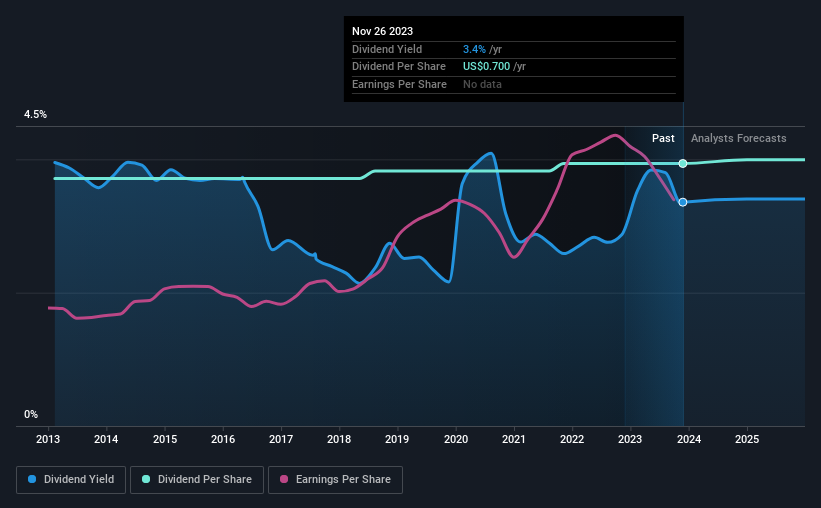There's A Lot To Like About CNB Financial's (NASDAQ:CCNE) Upcoming US$0.17 Dividend
CNB Financial Corporation (NASDAQ:CCNE) is about to trade ex-dividend in the next three days. Typically, the ex-dividend date is one business day before the record date which is the date on which a company determines the shareholders eligible to receive a dividend. The ex-dividend date is important as the process of settlement involves two full business days. So if you miss that date, you would not show up on the company's books on the record date. This means that investors who purchase CNB Financial's shares on or after the 30th of November will not receive the dividend, which will be paid on the 15th of December.
The company's next dividend payment will be US$0.17 per share, and in the last 12 months, the company paid a total of US$0.70 per share. Calculating the last year's worth of payments shows that CNB Financial has a trailing yield of 3.4% on the current share price of $20.85. Dividends are a major contributor to investment returns for long term holders, but only if the dividend continues to be paid. So we need to investigate whether CNB Financial can afford its dividend, and if the dividend could grow.
Check out our latest analysis for CNB Financial
Dividends are usually paid out of company profits, so if a company pays out more than it earned then its dividend is usually at greater risk of being cut. That's why it's good to see CNB Financial paying out a modest 27% of its earnings.
When a company paid out less in dividends than it earned in profit, this generally suggests its dividend is affordable. The lower the % of its profit that it pays out, the greater the margin of safety for the dividend if the business enters a downturn.
Click here to see the company's payout ratio, plus analyst estimates of its future dividends.
Have Earnings And Dividends Been Growing?
Companies with consistently growing earnings per share generally make the best dividend stocks, as they usually find it easier to grow dividends per share. Investors love dividends, so if earnings fall and the dividend is reduced, expect a stock to be sold off heavily at the same time. Fortunately for readers, CNB Financial's earnings per share have been growing at 11% a year for the past five years.
Many investors will assess a company's dividend performance by evaluating how much the dividend payments have changed over time. In the last 10 years, CNB Financial has lifted its dividend by approximately 0.6% a year on average. Earnings per share have been growing much quicker than dividends, potentially because CNB Financial is keeping back more of its profits to grow the business.
To Sum It Up
Has CNB Financial got what it takes to maintain its dividend payments? Typically, companies that are growing rapidly and paying out a low fraction of earnings are keeping the profits for reinvestment in the business. Perhaps even more importantly - this can sometimes signal management is focused on the long term future of the business. We think this is a pretty attractive combination, and would be interested in investigating CNB Financial more closely.
On that note, you'll want to research what risks CNB Financial is facing. For example, we've found 1 warning sign for CNB Financial that we recommend you consider before investing in the business.
Generally, we wouldn't recommend just buying the first dividend stock you see. Here's a curated list of interesting stocks that are strong dividend payers.
Have feedback on this article? Concerned about the content? Get in touch with us directly. Alternatively, email editorial-team (at) simplywallst.com.
This article by Simply Wall St is general in nature. We provide commentary based on historical data and analyst forecasts only using an unbiased methodology and our articles are not intended to be financial advice. It does not constitute a recommendation to buy or sell any stock, and does not take account of your objectives, or your financial situation. We aim to bring you long-term focused analysis driven by fundamental data. Note that our analysis may not factor in the latest price-sensitive company announcements or qualitative material. Simply Wall St has no position in any stocks mentioned.

